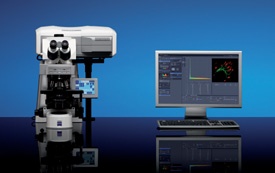Jan 30 2009
The anisotropy imaging technique is now available for the serial equipment of the LSM 710 laser scanning microscope from Carl Zeiss. It supplements the special imaging techniques such as RICS (Raster Image Correlation Spectroscopy) and FCS (Fluorescence Correlation Spectroscopy) already possible with the LSM 710. Users include cell biologists, scientists performing basic research in biology, medicine and biophysics, and physiologists who want to examine structure proteins in particular. The technique can be used together with spectral detection in order to track the formation or modification of directed molecular arrangements.
 The anisotropy imaging system on the LSM 710 laser scanning microscope from Carl Zeiss allows the examination of molecular arrangements.
The anisotropy imaging system on the LSM 710 laser scanning microscope from Carl Zeiss allows the examination of molecular arrangements.
In anisotropy imaging, light emitted by fluorescence-labeled proteins is split into its vertically and horizontally polarized portions. Both polarization images can be displayed or computed into an anisotropy image. The oriented proteins are separately displayed, and changes in the arrangement of these proteins are monitored over time. This not only permits the examination of balanced processes, but also provides information about chronological, structural changes, e.g. as a reaction to foreign substances.
With the LSM 710, anisotropy imaging is implemented with polarization filters which feature a very high extinction ratio and therefore generate high-contrast images. The polarization filters required for anisotropy imaging are optional for all LSM 710 or LSM 710 NLO systems. Upgrades at the customer’s site are available upon request. The technique is controlled using ZEN 2009 software.